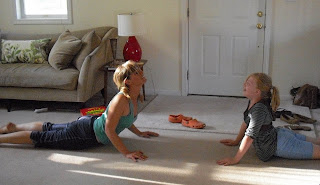
There is order in chaos. Intelligence within space. It may be difficult to see, but it's there and I can prove it: just spend one day in our ashram kitchen.
I had lofty hopes of taking lots of wonderful pictures on this visit, especially of our stunning gardens and orchard, to show how the gorgeous organic veggies are picked early in the morning and run down to the kitchen where they are made into beautiful dishes, served in the dining hall. But as usual, the kitchen swallowed me whole, and I was really only able to get a couple of pictures, and only of things that went on within its walls...
There, the miracle of feeding 600 people takes place 3 times a day. Sure, that's nothing compared with our Bangalore ashram, where, with joyful but military like precision, they feed tens of thousands, but for us, it still seems amazing. At first it was amazing that we could serve 200, and then we got a few more burners and a couple industrial sized pots and it was amazing that we managed to do 300 and 400. And every time we get logistically caught up to the numbers of people we need to feed, every time we get a bigger kitchen, bigger pots, a better strategy, more people show up. And thank god... otherwise what would be the point? There'd be no thrill. There'd be no need for magic or miracles, which is what our ashram kitchen thrives on...
Walking into the kitchen in the morning, scrubbing hands, tying on an apron, is more about mental preparation than anything else. You focus, take a deep breath... and go! And suddenly there is a team of 30 or 40 people--volunteer veggie prepers--all wanting direction at once (though there are only 2 sinks for washing veggies, and only 20 cutting boards). And you cannot cook for the hour and a half that they are present, but only stand in the centre of all of them and their urgent questions about peelers, and keep mentally repeating all the ingredients needed for the meal, eyes darting from fridge to sinks to chopping tables, thinking, "Is that everything? Once potatoes are done there they'll have to switch to squash... have the herbs come in from the garden yet? We won't be able to prep twenty bunches of thyme ourselves--the volunteers have to get it done... where on earth is it?" all the time reminding the choppers who have no cooking experience to keep things uniform in size. Even those who know about cooking are overwhelmed by the quantity--who isn't? The quantity detaches one from reality, makes food seem less like food and more like a dream, and when you put your hand in a bowl of chopped carrots and show them that some are the size of dimes and some of golf balls, you are greeted with looks of puzzlement. Then, in an instant they are gone. There is silence in the kitchen... and not a single empty surface--just bowls of all sizes, and pots from when they ran out of bowls, full of chopped vegetables. A sea of giant bowls and pots of vegetables. Everywhere. There is a moment of peace and then a shiver of panic as you look at the clock, quickly turn on flames beneath vessels larger than bathtubs, and begin! Adding herbs and spices and salt by the handful. Handful after handful. And as you spin around, checking on each simmering bathtub of food, and have lettuce sticking up and down both arms from tossing salad, you hear hundreds and hundreds of footsteps above you, filing into the dinning hall, and volunteers burst in the door yelling "What goes up?!" Then you are handing them bucket after bucket to fill with soup, and reciting the names of the 4 dishes that you've made to anyone who will listen, over and over, so that no serving station will be missing a dish. You are searching everywhere for one more serving spoon, two more ladles. And then the dinner cooks come in, scrub their hands, tie on their aprons, take a deep breath, and begin... and you, though you feel you are still in the middle of a whirlwind, realize that it is over. Still in your apron you slip out the door, and only realize what has just happened when you walk upstairs into the dinning room and see all those people happily, leisurely, enjoying lunch. And you wonder where on earth all that food came from. It is as if it manifested right out of thin air.
 My favorite thing of all that happens in the kitchen is making bread. One thousand chapatis.
My favorite thing of all that happens in the kitchen is making bread. One thousand chapatis.















